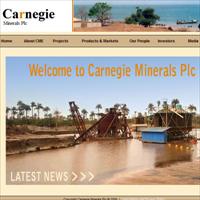Carnegie Minerals Latest Press Releases

16 January 2008
Gambian Operations Suspended
Carnegie announces that it has today received a letter from The Geological Department of The Office
of The President of Gambia requesting the Company to stop all mining operations in The Gambia
with immediate effect pending receipt of certain information in relation to its minerals mined and
laboratory results.
The Company firmly believes that they have been, and remain, in compliance with all the terms of its
mining license in The Gambia but have adhered to this request to stop mining operations with
immediate effect. The Company's priority is to provide all necessary information to The Gambia's
Geological Department in order to seek recommencement of operations as soon as possible.
A further announcement will be made in due course.
18 January 2008
President Jammeh announces the discovery of strategic minerals in the Gambia
13 February 2008
Cancellation of Gambian License
The Company has received notification from The Government of the Republic of The Gambia
of the cancellation of the licence to mine heavy mineral sands in which it holds an equal share
with joint venture partner Astron Ltd.
In the announcement of 1 February 2008 the Company stated that it had already fully provided
for this outcome. The Company is continuing to focus its efforts on its other existing and
emerging projects.
18 February 2008
Gambia Update
Following recent speculation, Carnegie Minerals Plc the AIM listed UK resource
company (AIM - CME), announces that Gambian police have detained the Company’s
recently appointed British mining engineer Charlie Northfield, over allegations that the
Company has been commercially mining Titanium, Iron ore and Uranium from its mineral
sands Licence in The Gambia. The Company strongly refutes these charges and is
working closely with the UK Foreign and Commonwealth Office to secure his release.
The Company wants to make clear that a component of mineral sands (Ilmenite, for
which we are licensed to mine) is Titanium and Iron oxide. We would also like to clarify
that trace amounts of uranium occurring in the Gambian mineral sands are usual for
such deposits and cannot be economically extracted and therefore have no commercial
value. The Company has previously notified the Gambian Government of this trace
occurrence in its previous information submission and that Carnegie was willing to pay
for independent international industry experts to review the Company’s mining data to
assist with their understanding of it.
The Company has provided to The Gambian Government continuous full disclosure with
each shipment since the start of the project. This included all weights, Independent SGS
laboratory results & pricing calculations. SGS is one the world’s leading testing and
inspection businesses.
Under the agreement signed with The Gambian Government prepared under the
guidance of the Commonwealth Development Corporation Ltd of the UK, in the event
any issue arose in relation to the project, there is a clear pre-agreed process which
involves independent arbitration in London.
The Company has previously announced on 13 February 2008, that it had received
notification from The Government of the Republic of The Gambia of the unilateral
cancellation of it’s licence to mine heavy mineral sands, and that the Company had
already fully provided for this outcome.
Alan Hopkins, MD of Carnegie Minerals said:
"We strongly refute all charges that the Gambian Government has levied against us. We
have been operating in The Gambia since 1999 and have always strongly adhered to
the legal processes as set out by the Gambian Government and our mining licence.
“We are now doing everything in our power to ensure the safe return of our employee.”
All news taken from Carnegie Minerals
 Back and Next - Back and Next
Back and Next - Back and Next See Also - See Also
See Also - See Also